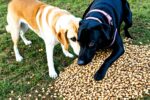The Health Benefits of Squash for Dogs

Squash is a nutritious vegetable packed with vitamins and minerals that can provide numerous health benefits for dogs. It contains vitamins A, C, and B6, as well as nutrients like folate, potassium, magnesium, fiber, and phosphorus. These nutrients support a dog’s vision, immune system, cardiovascular functions, digestion, muscles, kidneys, and nerves. Dogs can safely eat various types of squash, including spaghetti squash, acorn squash, and butternut squash. However, it is important to remove the seeds before feeding squash to dogs.
Key Takeaways:
- Squash is a nutritious vegetable that can provide numerous health benefits for dogs.
- Squash is packed with vitamins A, C, and B6, as well as nutrients like folate, potassium, magnesium, fiber, and phosphorus.
- Squash supports a dog’s vision, immune system, cardiovascular functions, digestion, muscles, kidneys, and nerves.
- Dogs can safely eat various types of squash, but the seeds should be removed before feeding.
- Consulting a veterinarian is always recommended before making any dietary changes for a dog.
Can Dogs Eat Squash? Tips for Feeding Squash to Dogs
Dogs can enjoy the benefits of squash in their regular diet, making it a recommended addition for their overall health. Squash provides essential vitamins, minerals, and fiber that contribute to a dog’s well-being.
When feeding squash to dogs, it is advisable to opt for organic squash whenever possible. Organic squash reduces the exposure to pesticides, ensuring a healthier meal for your furry friend. Additionally, it is crucial to wash the squash thoroughly before preparation to eliminate any potential germs.
Different varieties of squash are safe for dogs to eat, but it is important to remove the seeds. These seeds can pose digestion issues and should be carefully removed before serving. Squash can be served raw or cooked, but if served raw, it should be pureed or chopped into small pieces to prevent choking.
When it comes to cooking methods, steaming or roasting are recommended as they preserve the nutritional value of the squash. However, it is essential to avoid seasoning the squash with spices or adding harmful ingredients like onion, salt, or garlic, as they can be toxic to dogs.
Squash should be given to dogs in moderation, as part of a well-balanced diet. It is always a good idea to consult a veterinarian before making any significant dietary changes for your dog’s optimal health.
Tips for Feeding Dogs Squash:
- Choose organic squash whenever possible to minimize exposure to pesticides.
- Wash the squash thoroughly before preparing it for your dog.
- Remove the seeds as they can cause digestive issues.
- Serve squash raw, pureed, or cooked, but ensure it is chopped into small pieces to prevent choking.
- Steam or roast the squash to retain its nutritional properties.
- Avoid seasoning squash with spices or harmful ingredients like onion, salt, or garlic.
- Feed squash to dogs in moderation, as part of a well-balanced diet.
- Consult a veterinarian before making significant dietary changes for your dog.
Conclusion
Incorporating squash into a dog’s diet can be a beneficial choice for their health and nutrition. Dogs can safely consume different types of squash, but it is essential to remove the seeds and prepare it properly. By doing so, pet owners can unlock the many health benefits that squash offers to dogs.
Squash provides essential nutrients that contribute to various aspects of a dog’s well-being. It aids in maintaining skin hydration, improving digestion, promoting a healthy coat, and supporting the development of stronger muscles, kidneys, and nerves. These benefits make incorporating squash into a dog’s diet a wise decision.
When adding squash to a dog’s meal plan, it is advisable to opt for organic squash if available. Washing the squash before preparation reduces the risk of harmful contaminants. Additionally, serving squash either raw or cooked, without any seasonings, ensures that dogs can enjoy its natural goodness without any adverse effects.
However, as with any dietary changes, it is important to consult a veterinarian before incorporating squash or making any modifications to a dog’s diet. A professional’s expertise can help ensure that the dog’s nutritional needs are adequately met and that the diet remains balanced and suitable for their specific requirements.
By incorporating squash into a dog’s diet, pet owners can provide their furry friends with a range of essential vitamins, minerals, and fiber. These nutrients contribute to improved overall canine health and nutrition, supporting dogs in leading happy and healthy lives.
FAQ
Can dogs eat squash?
Yes, dogs can eat squash. Various types of squash, such as spaghetti squash, acorn squash, and butternut squash, are safe for dogs to consume.
What are the benefits of feeding squash to dogs?
Squash is a nutritious vegetable that can provide numerous health benefits for dogs. It contains vitamins A, C, and B6, as well as nutrients like folate, potassium, magnesium, fiber, and phosphorus. These nutrients support a dog’s vision, immune system, cardiovascular functions, digestion, muscles, kidneys, and nerves.
How should I prepare squash for my dog?
When feeding squash to dogs, it is important to remove the seeds and prepare it properly. Squash can be served raw or cooked, but if served raw, it should be pureed or chopped into small pieces to prevent choking. Cooking methods such as steaming or roasting are recommended. It is important to avoid seasoning the squash with spices or adding seasonings like onion, salt, or garlic, as they can be harmful to dogs.
Can I feed squash to my dog every day?
Squash should be given in moderation as part of a balanced diet. It is advisable to consult a veterinarian before making any changes to a dog’s diet, including the incorporation of squash.
Are there any precautions to take when feeding dogs squash?
While squash is generally safe for dogs, it is important to choose organic squash if possible to reduce exposure to pesticides. The squash should be washed before preparation to remove any potential germs. Additionally, always remove the seeds before feeding squash to dogs, as they can cause digestive issues.






